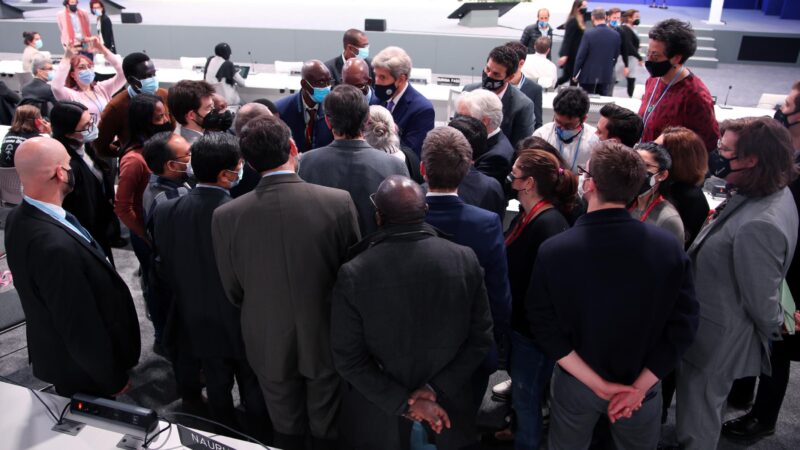African nations accepted a “moral commitment” that the US will deliver increased finance for developing countries to cope with intensifying climate impacts in exchange for backing the Cop26 deal in Glasgow.
In the final hours of the talks, the US, backed by the EU, and a group of 134 developing countries known as the G77 remained deeply divided about how to secure support for vulnerable nations to adapt to more frequent and intense flooding, droughts and cyclones.
Wealthy countries pledged a voluntary $356 million to the Adaptation Fund, including first-time contributions from the US and Canada. But developing countries wanted a more reliable source of adaptation finance than the changeable pledges of rich nations.
In a final diplomatic push, the G77 demanded that a share of revenue from voluntary and bilateral carbon trading be provided to the Adaptation Fund. For the African Group of Negotiators that was a red line.
The US, which strongly opposed the idea, refused to back down, seeing the proposal as a tax that infringed on the government’s ability to legislate.
“The developed world was saying ‘trust us, we’ll fund this voluntarily’,” Gabon’s environment minister Lee White told Climate Home News.
At that point, he said, “it was almost certain that if we started reopening the body of the final text of the Glasgow agreement, we weren’t going to get an agreement until Egypt,” where the next rounds of talks will be held in 2022.
“It’s going to get bumpy!” – Papua New Guinea sparked final day panic at Cop26
The issue is critical for African countries. A recent study by the UN Economic Commission for Africa found that Cameroon spends 9% of its GDP on coping with climate change, Ethiopia 8% and Sierra Leone, Senegal and Ghana are all more than 7%.
Yet adaptation finance only accounts for around a quarter of climate finance flows.
Under the Glasgow climate pact, donor nations agreed to “at least double their collective provision of climate finance for adaptation to developing countries from 2019 levels by 2025” – but the low baseline means this is a far cry from what vulnerable nations actually need.
African nations estimated their combined adaptation needs to cost between $7-15bn per year by 2020.
Countries agreed in Glasgow to earmark 5% of revenues from carbon trading under a centralised carbon market for the Adaptation Fund but a contribution is only “strongly encouraged” for bilateral transactions.
As the issue came to a head on Saturday, US special climate envoy John Kerry walked across the plenary floor to the G77 lead negotiator Ahmadou Sebory Toure to talk things through.
“It was the first discussion we had had at a political level about the issue,” said White, who was quickly pulled into the huddle.
Mia Mottley: the ‘fearless’ leader pushing a global settlement for the climate frontlines
Several diplomats involved in the discussions told Climate Home that Kerry refused to concede. He said the US had already agreed to doubling its adaptation finance and argued that the developing world had a lot to lose if it rejected the deal on the table.
Recalling the conversation during an interview, White told Climate Home: “I asked [Kerry] very clearly, if he was making a moral commitment to do all you can to make sure that these funds [for adaptation] flow. And he very clearly said: ‘Yes, I am making a moral commitment to Africa.’.”
After a similar conversation with EU green deal chief Frans Timmermans, a meeting was called between developing countries to assess Kerry’s assurances. But views on the US’ trustworthiness diverged.
The Alliance of Small Island States (Aosis) and Costa Rica argued that the final draft text was a better outcome than no deal at all, according to sources in the room.
For Africa, the pill was a lot more difficult to swallow. “How can you trust them to deliver? That is naïve if you believe they will,” said one African negotiator, adding that the adaptation money promised by the US was “insignificant” compared with what is needed.
Yet, walking away from the talks is not an option for many vulnerable nations, which have no other international space to make their voices heard, they said.
Eventually, “we decided that it was more beneficial to the people we represent to move forward with that strong moral commitment then to block everything for another year,” minister White said.
Speaking in Glasgow, Kerry said: “From our friend from Gabon who asked specifically that he have some reassurance before he leaves here on adaptation funding. I can assure our friend from Gabon and from the other countries concerned that every effort in the world will be made.
“There is a commitment that is real to double adaptation finance, including our own and that we will work in other ways to address the challenge of adaptation.”
Ambassador Janine Felson of Belize told Climate Home: “The ball is in the developed country parties’ court,” to present credible plans for delivering.
And there is no time to wait for the next round of talks at Cop27 to announce those plans, she added. “Rather, by the time we arrive in Egypt, they should be able to provide information on how those plans are progressing.”
